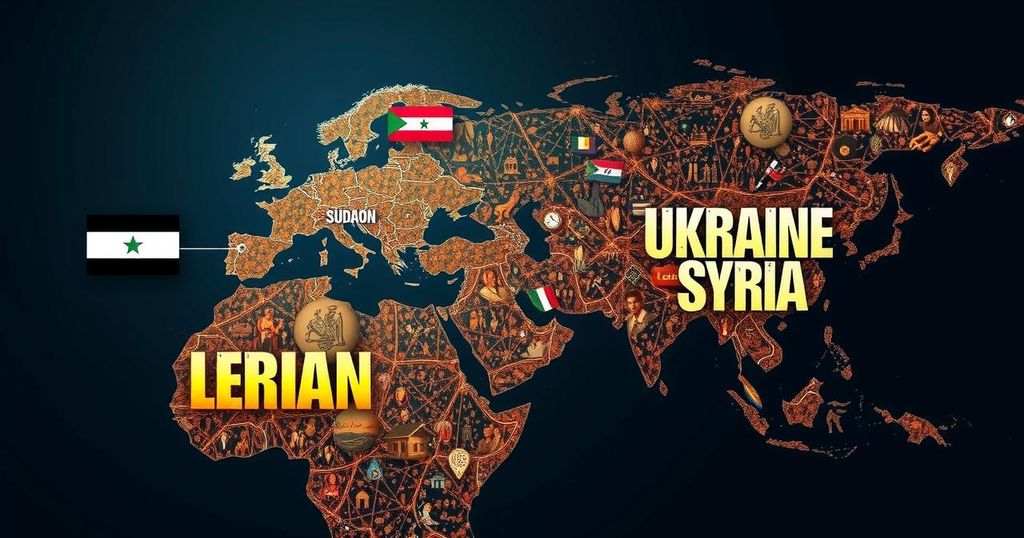Global Humanitarian Crises: Urgent Calls for Action in Six Regions
Today’s report highlights severe humanitarian crises in Sudan, the Occupied Palestinian Territory, Lebanon, Haiti, Ukraine, and Syria, emphasizing the urgent need for international attention and coordinated humanitarian response efforts as violence and natural disasters continue to impact millions. Key highlights include Sudan’s alarming displacement crisis, flooding in Gaza, escalating violence in Lebanon, gender-based violence in Haiti, continued hostilities in Ukraine, and funding shortages in Syria.
This report outlines the current humanitarian crises impacting several regions globally, specifically focusing on Sudan, the Occupied Palestinian Territory, Lebanon, Haiti, Ukraine, and Syria. Under-Secretary-General Tom Fletcher has emphasized the urgent need for global attention towards the staggering crisis in Sudan, where violence has led to mass displacements and challenges in delivering humanitarian aid. In the Occupied Palestinian Territory, OCHA has reported flooding affecting many displaced families, warning of inadequate contingency plans to tackle such disasters. Lebanon faces unprecedented violence and humanitarian suffering, with significant casualties reported in Beirut. Haiti’s gender-based violence crisis amplifies on the International Day for the Elimination of Violence against Women, as alarming trends show increased recruitment of children into armed groups. Ukraine continues to endure hostilities, resulting in civilian casualties and infrastructural damage. Lastly, Syria remains deeply affected by conflict, with funding shortfalls severely undermining humanitarian efforts.
Throughout these crises, humanitarian organizations are striving to provide critical aid under increasingly challenging conditions. In Sudan, Fletcher has highlighted the need to improve aid delivery across conflict lines, while the World Food Programme’s new flight routes will serve to expedite assistance in hard-hit regions. In Gaza, OCHA and partners are mobilizing response efforts to address flooding impacts, despite facing many operational restrictions. In Lebanon, the worsening violence demands a vital response, as the death toll has alarmingly escalated. OCHA also underscored the severe impact of violence on women and girls in Haiti, with numerous gaps in essential services for survivors of violence. Unrelenting attacks in Ukraine have resulted in civilian suffering and infrastructural damage, adding urgency to ongoing humanitarian interventions. Efforts in Syria are hindered by limited funding, threatening the UN’s ability to assist millions in need.
The humanitarian landscape across these regions paints a dire picture of ongoing conflicts and crises that call for immediate global awareness and action. Coordination among humanitarian organizations remains essential to mitigate suffering and deliver necessary support amid these challenging circumstances. Allowing for sustained humanitarian aid will remain crucial to address the profound needs of affected populations in each area.
The recent humanitarian report highlights the ongoing crises affecting multiple countries. In Sudan, the urgent need for humanitarian assistance is exacerbated by ongoing violence and mass displacements. The situation in the Occupied Palestinian Territory is similarly dire, as families face flooding and inadequate contingency plans for disasters. Lebanon experiences extreme humanitarian challenges, with rising casualties amid escalating violence. In Haiti, systemic violence disproportionately affects women and girls, compounded by alarming child recruitment into armed groups. Ukraine continues to experience violence and damage to infrastructure due to ongoing conflicts, while Syria’s humanitarian needs are increasingly unmet due to funding deficits. Each of these regions faces distinct but equally critical challenges that require immediate attention and intervention.
In conclusion, the report brings to light the pressing humanitarian crises affecting Sudan, the Occupied Palestinian Territory, Lebanon, Haiti, Ukraine, and Syria. The situations in these regions necessitate urgent international attention and coordinated action to mitigate the suffering of millions. Humanitarian organizations are working tirelessly to address these challenges, but resource limitations and ongoing violence continue to hamper their efforts. It is imperative for the global community to commit to providing support and resources to assist those most in need.
Original Source: www.unocha.org




Post Comment